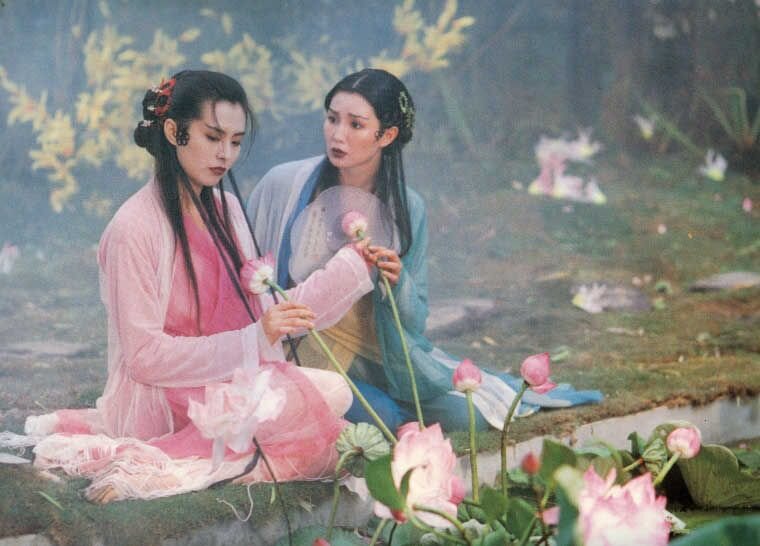GREEN SNAKE (1993)
Directed by: Tsui Hark
Starring: Joey Wong, Maggie Cheung, Chiu Man-cheuk, Wu Hsin-kuo, Tien Feng
Madame White Snake, one of the four great folk tales of China, has been adapted for the screen numerous times. Travelling puppet troops perform its key scenes (the Scholar on the Lake portion was seen in Hou Hsiao-hsien's Puppetmaster), and it’s become a standard of repertory Chinese opera companies. It's fitting that Tsui Hark, Hong Kong's greatest filmmaker, would have his own version, and it's equally fitting that his version would be a hallucinogenic nightmare of sexual repression, the violation of species purity, and religious violence.
Sinuously unspooling in hard candy colors, Green Snake is as stylized as a stage play. The two leads are slithering, sexy snake sisters who have practiced for hundreds of years to become human. The eldest sister, White (Joey Wong), wants to experience love and sex the way people do; the younger sister, Green (Maggie Cheung), simply wants to tag along with her sister. Having had only five hundred years of training she’s liable to drop her human form at the first hint of hardship, preferring slinking through the water to stumbling on two brittle legs over the hard ground.
The third character is a Buddhist monk (Chiu Man-cheuk) a scalding hot one-man Inquisition, who’s tortured by the sexual desires he has managed to repress, not renounce. He still has the red dust of the material world clinging to his shoes, and this torments him as he pursues his righteous mission of species purity: wiping out and imprisoning all animals who attempt to become human. This seems to be a big problem in the world of Green Snake, populated by fallen, filthy humans, noble insects struggling to become more than they are, and superhuman monks who try to keep everyone in order, and if that means killing them or rendering them deaf and dumb, well too bad.
One of Tsui Hark's most technically accomplished (and most beautiful) films, Green Snake rejects stiff Western ideas of "realism" for a Chinese Opera stagecraft that strives for stylization. The special effects turn their back on the oppressively digital for the large-scale mechanical and in-camera effects, resulting in crude but striking visuals that weave a funky charm all their own. With the action underscored by traditional Chinese opera music (as it would be onstage), and wrapped in a poignant score that’s part Enya, part tribal drumming, part Indian musical, and part found sound, Green Snake creates a fabulously artificial world where sudden revelations strike characters comatose; sexual discovery sparks a foaming, spewing flood that kills thousands; suspicion manifests as a rancid yellow fog; desire is an icy haze of venomous breath; and the first 10 minutes of the film are a wordless montage as our two snake sisters find their curiosity about humanity — both sexual and intellectual — growing into a physical itch that only violating the natural laws of the universe can scratch.
A lush eroticism infuses the film, oozing off the screen in a warm wave of Technicolor glory. Maggie Cheung slithers away with the show as Green, joyriding in her human body and consumed with a curiosity about what's up a monk's robes. Joey Wong gives the best performance of her career and Chiu Man-Cheuk is simultaneously severe and sexy in his first onscreen role as the nasty Buddhist monk. Green Snake, being a Tsui Hark film, is packed tight with jokes, action, melodrama and romance until it's practically exploding, but this time there's a deep sadness around its heart. Faults can be found in the production, whose reach sometimes exceeds its grasp, but those choosing to focus on them miss the point. As Tsui Hark says, "Cinema shouldn't be taken so seriously. It's entertainment, and its purpose is to fill those gaps of feeling when you're bored and frustrated with life and want to feel better."
Gloriously indecent, in Tsui Hark's world Green Snake is a perfect entertainment: irreverent, beautiful, and full of spectacle. The tragedy at its core just makes it that much more romantic, and as the years pass it ripens into something more than a masterpiece.
